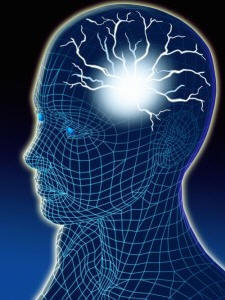Connections Through Time,
Issue 20: July – September 2003
Just as the human eye sees only a small part of the light spectrum and the human ear can detect only a fraction of nature’s sounds so that which is comprehensible to the human mind is only a small fraction of our reality.
– Author unknown

In the previous article, body-precognition is discussed – the scientific data indicate that your body has direct access to at least some information about the future. Note that body-precognition is achieved without the conscious mind. This type of a activity is controlled by your autonomic nervous system. You would have trouble consciously functioning if this part of your nervous system did not assume some important responsibilities. Imagine, for example, if you had to consciously take care of every inhale/exhale of your breath and every beat of your heart. Similarly, since information about the future would rapidly become overwhelming to your mind, one hypothesis is that the autonomic nervous system acts as a buffer between precognitive information and your conscious mind.
The challenge is to be able to select the information that you wish to receive, probably by using conscious intentions and then trusting your body’s nervous system to communicate with your consciousness. You know, by direct experience, that you are a conscious being. Your conscious mind permits you to think, to feel, to choose and to experience your life. What about your subconscious mind? Your autonomic nervous system may be the physical link to what is usually referred to as the subconscious or unconscious mind. This link fits with the idea that your subconscious-forgotten fears and anger can be stored in your body and can cause illness.
For example, stressful situations and traumatic incidents leave marks in your autonomic nervous system. What if future situations and incidents also leave marks, subtle marks, in your autonomic nervous system? If so, then we have a possible physical mechanism for understanding precognition. The autonomic system is able to recognize precognitive information and under some conditions this information is communicated to the conscious mind through emotions, thoughts and/or spontaneous actions.
For example, Controlled Remote Viewing (CRV) uses this spontaneous approach to gather information not normally available to the conscious mind. CRV recognizes the importance of the body being the pathway for precognitive and other “normally hidden” information. Here is a discussion from the official military CRV manual: RV theory relies on a rather Freudian model of human consciousness levels.
The lowest level of consciousness is paradoxically named the “unconscious.” All this label really means is that that part of our mental processes we know as physical “awareness” or “consciousness” does not have access to what goes on there. It is apparently this part of the individual’s psyche that first detects and receives the signal line.
From here it is passed to the autonomic nervous system (ANS). When the signal line impinges on the ANS, the information is converted into a reflexive nervous response conducted through muscular channels controlled by the ANS. … At the same time, the signal is passed up through the subconscious … and into the lower fringes of the consciousness. It is worth pausing to appreciate that your subconscious mind and your conscious mind communicate through your body? Your body’s nervous system, with 100 billion neurons and 100 trillion synapses, is complex enough to receive and communicate precognitive information to your consciousness.
References Quote File Human Nervous System
Related articles






